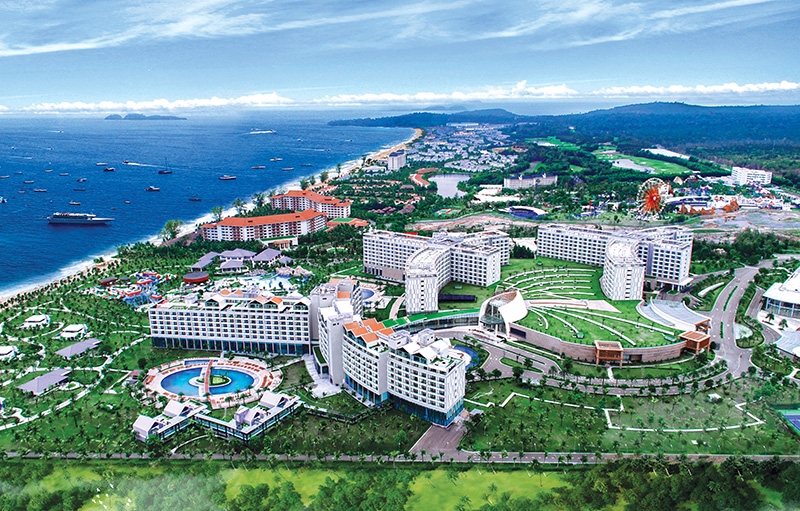Condotel developing slows amid restrictions
 |
| Amid an incomplete legal framework, the condotel market currently also suffers from oversupply |
Competent bodies have recently issued decisions to impose stricter management on condotels, resort villas, and officetels which have been not granted ownership yet, while the oversupply is bringing lower profits and causing disputes between developers and owners.
The Ministry of Public Security (MoPS) has proposed the government to temporary halt all new license certificates for new projects and do not permit conversion of condotels into houses.
In its report submitted to the government on the shortcomings in laws over condotels, tourist villas, and officetels, the MoPS clarified issues regarding management and trading of the estates.
The previous permission from some local authorities in Danang and Ba Ria-Vung Tau where certificates were issued for condotels have put pressure on social infrastructure and raised many complex issues about economic and social security.
“If the certificate is granted to condotel owners, buyers could mortgage their assets to get loans. This could cause credit insecurities as most investors mortgage their projects at banks,” the ministry said.
Hanoi People’s Committee also last week issued a document to strengthen the management of investment, construction, and trade for these properties.
The committee assigned related departments of construction, planning and investment, natural resources and environment, and tourism as well as local district authorities to review all recent projects, to ensure that they are strictly under the approved plans.
The same document was also issued by Binh Dinh People’s Committee to temporary halt all new projects to wait for more guidelines from related ministries.
In early 2020, the Ministry of Construction (MoC) issued a document to direct and guide local People's Committees on a number of contents related to investment management of tourism property.
In particular, the MoC requires strict control of projects which are converted from tourist into residential units. All of those properties must be in accordance with the current laws and regulations.
To battle the shortage of legal framework for tourism property, the MoC will continue proposing amendments and supplements of the Law on Real Estate Business and Decree No.76/2015/ND-CP detailing the implementation of a number of articles of the Law on Real Estate Business. Accordingly, it will specify the construction and business of tourist apartments, villas, and officetels to ensure benefits for all parties.
Ho Chi Minh City Real Estate Association (HoREA) chairman Le Hoang Chau said he has repeatedly opposed conversion of condotels into residential projects because they are two types of land with vastly different uses.
Chau said a condotel is a project belonging to tourism service land. They are created for Vietnam’s tourism needs, which are developing fast and requires high-class infrastructure. Meanwhile, housing is land for residential residents and, in addition to accommodation, they need more public utilities to serve communities such as schools and hospitals.
“Therefore, the conversion from condotel to residential projects would create a lack of uniformity in tourism development infrastructure as well as long-term revenue of localities,” Chau explained.
According to economist Ho Ba Tinh, condotels are revealing a weakness in management. Apart from disputes rising between developers and buyers, some illegal activities have been uncovered in condotels and officetels, where expats were found to have organised illegal gambling and online betting, negatively impacting the security of the community.
“The uncertain legal framework is causing high risk for both developers and buyers, and bankers as well. Therefore stricter management is a reasonable step to conduct business into a better way,” Tinh said.
The condotel crisis is not happening in Vietnam only, Tinh added. “The market is now in difficult circumstances where developers and buyers are not secured by a completed legal framework and an oversupply,” he said.
The stricter management, Tinh said, is a must-do to harmonise supply and complete a legal framework.
“The market will self-select. The ones that are prestigious enough could still be in good business,” added Tinh.
Despite controversial opinions on the existing condotels and officetels, more than 6,300 condotel units were given a license in the first half of 2020, increasing the total to around 83,000 units.
On its report of the first half of this year, the MoC cited that 92 tourist property projects were given a license, offering 6,300 condotel units, 197 resort villas, and 46 officetels. In addition to these, 91 other projects with 19,900 condotels and more than 8,400 resort villas are also under construction.
The figures reveal that the supply of condotels remain high despite the legal framework not yet being completed, containing many risks to both developers and buyers.
According to a report from the Vietnam Real Estate Association, Vietnam now has more than 83,000 condotels, 28,000 tourism villas, more than 12,600 hotel rooms, and 15,600 shophouses, as well as more than 16,500 officetels mostly located in Hanoi, Ho Chi Minh City, Quy Nhon, Binh Thuan, Khanh Hoa, Danang, Kien Giang, and Quang Ninh.
| Kenneth Atkinson - Vice chairman, Vietnam Tourism Advisory Board
The lack of regulations and clarity around the issue of condotels and the ownership titles thereof have been a major challenge for developers and the tourism and hospitality industry over the last few years. However, most of these projects have been built as part of tourism projects, in areas where it has been clear that the land has been designated for tourism development and as such, only long leasehold agreements were permissible. It was not possible to issue red books to evidence titles to individual buyers, with them resting with the developer. Some developers seem to have ignored these guidelines when selling individual units. Clarity and specific regulations have been requested by many for some time now, so clarification of the situation is really long overdue. However, the fact remains that many of these projects have been completed or are under construction and this stock of real estate will have to be absorbed into the local infrastructure either as titled property or tourism property under long lease. The Tourism Advisory Board (TAB) has been calling for clarity of the regulations for a long time and finally concluded that proper title should be allowed as it would put condotels in the same category as freehold apartments. In order to support the project owners, the TAB proposed the promulgation of a set of condotel construction standards to ensure safety and conformity with regulations for residential apartments and also for hotels, as tourism properties do have different safety and security requirements. Whether the proposals of the MoC are reasonable or not depend on which side of the fence you sit. But what is urgently needed from the government aligned with all related departments is a final uniform policy on this matter, which is evenly applied across all tourism properties and condotel projects, in all provinces and localities. Nguyen Hoang - R&D director, DKRA
Despite having strongly developed during 2016-2018, the tourism property market, including condotels, second homes, and officetels has been on a downturn recently. Due to the lack of a legal framework, the consumption has declined, ending in an and oversupply. In that situation, the fact that some localities propose to suspend the licensing of new projects and strengthen the management of construction investment and business with this type of real estate, is reasonable and necessary. In addition, the government should soon make adjustments in project planning and existing regulations for this type of real estate. Currently, the legal chassis has many shortcomings. For example, the Ministry of Natural Resources and Environment has issued document No.703/BTNMT-TCQLDD dated February 14, guiding the issuance of sovereignty for this type of real estate. However this document does not set up specific provisions on the rights and responsibilities of related sides. A proposal to permit foreigners to buy condotels or second homes is necessary for the development of the real estate market. In the long run, second home properties, condotels, and officetels are still a growing trend with high potentials. Therefore, the proposed pause is only for temporary period. After the market become more positive and the competent bodies issue clearer legal provisions, the licensing could be resumed to meet the demand of the market. Jack Nguyen - Partner, Mazars
Condotel owners should be granted residential projects. If they are not granted an ownership certificate, condotel businesses will not flourish. The issue about condotels being a credit risk doesn’t really matter because that issue is between the bank and the investors and therefore this should not be relevant to the various ministries. Therefore, the government should enact laws that allow condotel investors to buy and own these properties similar to condo residences. Currently condotel projects are being ruled by too many industries when in fact only two or maybe three ministries should be governing these types of projects. There are two issues that should be clarified: ownership of the condotels and the management and operations of the condotels. By its definition, condotels are bought and invested by individual owners but managed by hotel operators. For owners and investors, the laws relating to condotel ownership should be very similar to residential ownership; therefore they should be able to obtain the red book, have the ability to buy and sell similar to condo ownership, and pay the appropriate fees and taxes for each transaction. For the construction of condotels, the laws for them should be guided similar to hotel construction in terms of location, construction, and operations. Only ministries currently involved with approving hotel construction and operations should be involved with condotels. What the government should do is outlaw developers that promise fixed returns for condotel investors. Often the only reason developers do this is to attract investors, and these should understand that they are entering a “hospitality” business and accept the risks associated with them. |
What the stars mean:
★ Poor ★ ★ Promising ★★★ Good ★★★★ Very good ★★★★★ Exceptional
 Tag:
Tag:
Related Contents
Latest News
More News
- Saigon Centre gains LEED platinum and gold certifications (February 12, 2026 | 16:37)
- Construction firms poised for growth on public investment and capital market support (February 11, 2026 | 11:38)
- Mitsubishi acquires Thuan An 1 residential development from PDR (February 09, 2026 | 08:00)
- Frasers Property and GELEX Infrastructure propose new joint venture (February 07, 2026 | 15:00)
- Sun Group led consortium selected as investor for new urban area (February 06, 2026 | 15:20)
- Vietnam breaks into Top 10 countries and regions for LEED outside the US (February 05, 2026 | 17:56)
- Fairmont opens first Vietnam property in Hanoi (February 04, 2026 | 16:09)
- Real estate investment trusts pivotal for long-term success (February 02, 2026 | 11:09)
- Dong Nai experiences shifting expectations and new industrial cycle (January 28, 2026 | 09:00)
- An Phat 5 Industrial Park targets ESG-driven investors in Hai Phong (January 26, 2026 | 08:30)


























 Mobile Version
Mobile Version